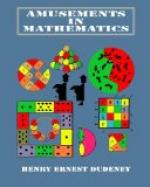+—–+—–+—–+—–+—–+—–+—–+—–+ | * | | | | | | | | +—–+—–+—–+—–+—–+—–+—–+—–+ | | * | | | | | | | +—–+—–+—–+—–+—–+—–+—–+—–+ | | | * | | | | | | +—–+—–+—–+—–+—–+—–+—–+—–+ | | | | * | | | | | +—–+—–+—–+—–+—–+—–+—–+—–+ | | | | | | | | | +—–+—–+—–+—–+—–+—–+—–+—–+ | | | | | | | | | +—–+—–+—–+—–+—–+—–+—–+—–+ | | | | | | | | | +—–+—–+—–+—–+—–+—–+—–+—–+ | | | | | | | | | +—–+—–+—–+—–+—–+—–+—–+—–+
]
Now the new Grand Lama was an inferior chess-player, and preferred other forms of innocent amusement, such as cutting off people’s heads. So he discouraged chess as a degrading game, that did not improve either the mind or the morals, and abolished the tournament summarily. Then he sent for the four priests who had had the effrontery to play better than a Grand Lama, and addressed them as follows: “Miserable and heathenish men, calling yourselves priests! Know ye not that to lay claim to a capacity to do anything better than my predecessor is a capital offence? Take that chessboard and, before day dawns upon the torture chamber, cut it into four equal parts of the same shape, each containing sixteen perfect squares, with one of the gems in each part! If in this you fail, then shall other sports be devised for your special delectation. Go!” The four priests succeeded in their apparently hopeless task. Can you show how the board may be divided into four equal parts, each of exactly the same shape, by cuts along the lines dividing the squares, each part to contain one of the gems?
292.—THE ABBOT’S WINDOW.
[Illustration]
Once upon a time the Lord Abbot of St. Edmondsbury, in consequence of “devotions too strong for his head,” fell sick and was unable to leave his bed. As he lay awake, tossing his head restlessly from side to side, the attentive monks noticed that something was disturbing his mind; but nobody dared ask what it might be, for the abbot was of a stern disposition, and never would brook inquisitiveness. Suddenly he called for Father John, and that venerable monk was soon at the bedside.
“Father John,” said the Abbot, “dost thou know that I came into this wicked world on a Christmas Even?”
The monk nodded assent.
“And have I not often told thee that, having been born on Christmas Even, I have no love for the things that are odd? Look there!”
The Abbot pointed to the large dormitory window, of which I give a sketch. The monk looked, and was perplexed.
“Dost thou not see that the sixty-four lights add up an even number vertically and horizontally, but that all the diagonal lines, except fourteen are of a number that is odd? Why is this?”
“Of a truth, my Lord Abbot, it is of the very nature of things, and cannot be changed.”




